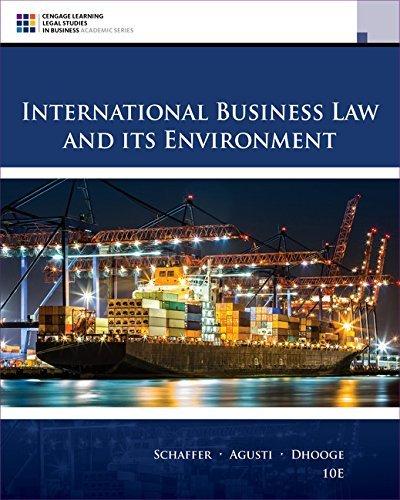The Bhopal disaster litigation presented the anomaly of Indian plaintiffs seeking to maintain their lawsuit in the
Question:
But was it ethical? The answer may depend on the ethical theory one applies to the question. For example, teleological frameworks focusing on the consequences of one's actions lead to mixed results. One such framework, ethical egoism, recognizes that people act in their own self-interest and thus a person should act in a manner that best promotes his or her interests unless the net result will generate negative rather than positive results. Union Carbide clearly acted in its own self-interest in forcing the litigation to India, but the net result was a significant financial undervaluation of the victims' lives. Another theory within the teleological framework is moral relativism, which focuses on determining what is right behavior based on the time and place of the circumstances. Were the terms of the settlement proper given the location of the catastrophe and the financial circumstances of the largely poor and undereducated victims of the gas leak? Finally, utilitarianism focuses on whether an individual's action adds to the overall utility of the community. Ethical conduct is that which is likely to produce the greatest overall good not just for the decider but for all persons who will be affected by the decision. The financial well-being of the victims may have been enhanced had the litigation been permitted to proceed in the United States, although it is equally possible that this well-being would have been diminished by procedural delays and appeals. However, if one determines that the greater good resides with those interested in the continued financial well-being of Union Carbide, then the outcome was ethically defensible. By contrast, deontological frameworks focus on duties rather than outcomes. For example, Immanuel Kant's Categorical Imperative provides that "[o]ne ought to act such that the principle of one's act could become a universal law of human action in a world in which one would hope to live" and that "[o]ne ought to treat others as having intrinsic value in themselves, and not merely as a means to achieve an end." Would anyone want Union Carbide's conduct in the Bhopal disaster litigation to become an example for companies confronted with similar catastrophes in the future? Was the settlement simply a means of preserving the company's assets and shareholder value at the victims' expense?
The theory of contractarianism holds that membership in society is imbued with certain duties and responsibilities and that rational people will always select the course of action that is the fairest and most equitable resolution of a dilemma without regard for personal consequences. Did Union Carbide abide by its duties and responsibilities to the community in Bhopal, especially given the lethal nature of the products it was producing and the large information gap between itself and the people living close to the plant? Did Union Carbide choose the fairest and most equitable resolution of the litigation without regard for consequences? As a profit-driven entity, should it have made such a choice? Is contractarianism unrealistic given that inequality is a fact of life? What conclusions do you reach and why?
Fantastic news! We've Found the answer you've been seeking!
Step by Step Answer:
Related Book For 

International Business Law And Its Environment
ISBN: 9781305972599
10th Edition
Authors: Richard Schaffer, Filiberto Agusti, Lucien J. Dhooge
Question Posted:





